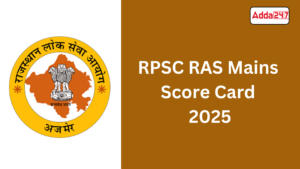Table of Contents
UPSC Prelims Syllabus 2025
According to the UPSC Calendar 2025, the UPSC IAS Examination is going to be conducted on 25 May 2025 in offline mode. Candidate should start preparation for the first stage with UPSC Prelims Syllabus 2025. Aspirants have just a few months left for the prelims exam 2025. With dedication, perseverance, and a strategic approach, candidates can increase their chances of success in the UPSC Prelims Exam and move one step closer to their dream of serving the nation in prestigious administrative roles.
UPSC Prelims Syllabus 2025 – Overview
The UPSC Exam 2025 is one of India’s most prestigious and challenging exams, administered by the Union Public Service Commission (UPSC).
| UPSC Prelims Syllabus 2025 | |
| Events | Dates |
| UPSC Notification 2025 | 22 January 2025 |
| UPSC Prelims Exam Registration | 11 February 2025 |
| UPSC Prelims Admit Card Release Date | To be Released |
| UPSC Prelims Exam Date | 25 May 2025 |
UPSC CSE Prelims Result 2025 – out
UPSC Prelims Syllabus 2025 for Paper 1
The first paper in the UPSC prelims exam consists of General Studies (GS). The UPSC Prelims Syllabus 2025 for General Studies can be categorised into the subsequent sections.
- Current Affairs (Events) of national and international importance.
- History of India and Indian National Movement.
- Indian and World Geography-Physical, Social, and Economic Geography of India and the World.
- Indian Polity and Governance – Constitution, Political System, Panchayati Raj, Public Policy, Rights Issues, etc.
- Economic and Social Development – Sustainable Development, Poverty, Inclusion, Demographics, Social Sector Initiatives, etc.
- General issues on Environmental Ecology, Biodiversity and Climate Change: that do not require subject specialization.
- General Science
The subject-wise topics that could be commonly asked in the UPSC Prelims Exam has been discussed in the below section. If you are planning to prepare for the UPSC Prelims exam 2025, then you must not skip any topic from the below section as every topic holds its importance.
UPSC Prelims Syllabus for Geography
General Geography
- Universe
- Earth Evolution
Geomorphology
- Earth’s Interior
- Geology and Rock System
- Geomorphic Process
- Earthquakes and Volcanism
- Distribution of Continents and Oceans
- Landforms and their evolution
- Landforms across the world
Oceanography
- Hydrosphere
- Submarine Relief Features
- Temperature and Salinity
- Waves, Oceans, Currents, Tides
- Marine Resources
- Ocean, Deposits and Corals
Climatology
- Atmosphere
- Inversion of Temperature
- Insolation and Heat Budget
- Air Mass, Fronts, Cyclones and Jet Streams
- Wind and Pressure Belts
- Precipitation
- Climate Zones of the World
Bio Geography
- Soil Characteristics
- Vegetation Resources
Human and Economic Geography
- Demography and Census
- Human Development
- Economic Activities
- Transport and Communication
- International Trade
- Settlement
Indian Geography
- Physiography of India
- Drainage System
- Climate
- Soils in India
- Natural Vegetation
- Population
- Settlements and Urbanization
- Land Resource
- Mineral Resource
- Energy Resource
- Agriculture and Basic Terminology
- Recent developments in agriculture
- Productivity of Crops
- Industry
- Transport
- Recent developments in Industry and Transport
World Regional Geography
- Continents, Countries, and Cities
- Location in News
UPSC Prelims Syllabus for Ecology & Environment
Ecology
- Origin of Life Forms
- Basic Concepts of Ecology
- Ecosystem Functions
- Population Ecology
- Adaptation of Species and Interactions
- Terrestrial Ecosystem
- Aquatic Ecosystem
- Nutrient Cycling
Biodiversity
- Basics of Bio-Diversity
- Animal and Plant Diversity
- Threats to Biodiversity
- Biodiversity Conservation
- Estuaries
- Mangroves
- Coral Reliefs
- Wetlands
- Resource Degradation and Management
- Environmental Pollution
- Climate Change
- Environmental Governance
UPSC Prelims Syllabus for History
Ancient History
- Pre-Historic Times
- Indus Valley Civilization
- Rig Vedic Period
- Later Vedic Period
- Jainism
- Buddhism
- Mahajanpadas
- Mauryan Period
- Post-Mauryan Period
- Gupta Period
- Harshwardhana Period
- Sangam Period (South-Indian Dynasties)
Medieval History
- Major Dynasties of Early Medieval India (Pratiharas, Pallavas, Chalukyas, Rashtrakutas)
- Cholas and South-Indian Kingdoms
- Early Muslim Invasions
- The Delhi Sultanate
- Afghans, Rajputs & Mughals
- Establishment of North-Indian Empire
- The Mughal Empire
- Marathas and the Other Indian States
- The decline of the Mughal Empire
- Vijaynagar Empire
Modern History
- Advent of Europeans
- British Expansion
- Administration before 1857
- Economic Policies of the British
- Impact of British Administration
- Revolt of 1857
- Administrative Changes after 1857
- Development of Civil Services
- Development of Education
- Development of Press
- Socio-Religious Reforms
- Peasant Movements
- Revolutionary Nationalism
- Indian National Movement-I (1905-1918)
- Indian National Movement-II (1918-1929)
- Indian National Movement-III (1930-1947)
- Governors-General and Viceroys of India
- Constitutional Development of Indian
UPSC Prelims Syllabus for Art & Culture
- Architecture
- Sculpture
- Paintings
- Pottery Tradition
- Numismatics
- Performing Arts
- Religion and Literature
- National and Regional Festivals
UPSC Prelims Syllabus for Polity
- Evolution of the Consitution
- Salient Features of the Indian Constitution
- Union & Its Territory
- Citizenship
- Fundamental Rights
- Directive Principles of State Policy
- Fundamental Duties
- System of Governance
- Union Executive
- Union Legislature
- State Executive
- State Legislature
- Local Government
- UT and Special Areas
- Judiciary
- Constitutional & Non-Constitutional Bodies
- Political Dynamics (Political Parties, Elections, Pressure Groups)
- Governance
- International Relations
UPSC Prelims Syllabus for Economy
Basic Concepts
- Macroeconomic Concepts
- Microeconomic Concepts
Economic Measurements
- National Income & Its Calculation
- Economic Growth and Development
- Inflation
Money & Banking
- Money Function & Classification
- Financial Markets & Its Instruments
- Banking Structure in India
Public Finance in India
- Budgeting
- Fiscal Policy
- Centre-state Distribution
- Tax Structure in India
Planning
- Meaning, Objective & History
- Planning Institutions
- Five-Year Plans in India
- NITI Aayog
Open Economy
- Foreign Trade Concepts
- International Organizations
- Trade Agreements
- Recent Development
Economic Sectors
- Poverty
- Employment and Unemployment
- Government Schemes and Programmes
UPSC Prelims Syllabus for General Science
- Science & Technology in India
- Space
- IT and Communication
- Materials, Nano Technology and Robotics
- Defence
- Nuclear Technology
- Intellectual Property Rights and Other Miscellaneous Issues
- Biotechnology
UPSC CSAT Syllabus 2025
The CSAT (Civil Services Aptitude Test) syllabus for the UPSC exam is designed to assess the candidate’s aptitude and reasoning abilities. Here is the UPSC syllabus 2025 presented in paragraph form, followed by a bullet point format for easy reference:
- Comprehension: Tests your ability to read, understand, and analyze passages.
- Interpersonal and Communication Skills: Assesses your ability to interact and communicate effectively.
- Logical Reasoning and Analytical Ability: Evaluates your problem-solving and logical thinking skills.
- Decision-Making and Problem-Solving: Tests your ability to make sound decisions and solve problems under different scenarios.
- General Mental Ability: Measures your cognitive skills and mental agility.
- Basic Numeracy: Assesses your understanding of numbers and basic mathematics (up to Class 10 level).
- Data Interpretation: Evaluates your ability to analyze and interpret data presented in graphs, tables, or charts.
UPSC Prelims Exam Pattern 2025
The UPSC Prelims Exam pattern consists of two papers: General Studies (GS) Paper I and Civil Services Aptitude Test (CSAT) Paper II. Both papers are conducted in offline mode (pen and paper-based) and have a duration of two hours each. GS Paper-I consists of 100 questions, while CSAT Paper-II contains 80 questions. Both papers are objective-type multiple-choice questions (MCQs). The Prelims Exam is a screening test, and only candidates who clear it are eligible for the Mains Exam.
| UPSC Prelims Exam Pattern 2025 | ||
| Details | General Studies Paper 1 | CSAT |
| Number of questions | 100 | 80 |
| Marking Scheme | 2 Marks for every correct answer | 2.5 Marks for every correct answer |
| Negative Marking | -0.66 | -0.83 marks for every incorrect answer |
| Duration of exam | 2 hours | 2 hours |
| UPSC Prelims 2025 Exam Date | 05 May 2025 | 05 May 2025 |
| Language of exam | English/Hindi | English/Hindi |
| Maximum marks | 200 | 200 |
Best Books for UPSC IAS Exam
Books are crucial for UPSC Prelims preparation, offering detailed knowledge, clear concepts, and thorough coverage of subjects. Written by experts, these books match the syllabus and help you understand topics. They are useful for revision and improving critical thinking, analytical skills, and answer writing. They also provide historical context and current affairs insights. Choosing the right books and using them well is key to success. Here is a list of important books for the UPSC Syllabus 2025:
- Ancient India by RS Sharma
- India after Independence by Bipan Chandra
- History of Medieval India by Satish Chandra
- Geography of India by Majid Husain
- World Atlas (Orient Black Swan)
- Certificate Physical and Human Geography by G C Leong
- Ethics, Integrity and Aptitude for Civil Services Main Examination by Subba Rao and P.N. Roy Chaudary
- Environment and Disaster Management by Tata McGraw Hill
- Indian Economy – Nitin Singhania
- Challenges to Internal Security of India by Ashok Kumar
How to Prepare for the UPSC Prelims Exam?
How to prepare for the UPSC Prelims exam? Well, candidates can follow the tips provided below to know how to prepare well for the exam:
- Understand the upsc syllabus: Familiarize yourself with the UPSC Prelims syllabus and exam pattern.
- Create a study plan: Make a comprehensive study plan that covers all subjects and topics, allocating sufficient time for each.
- Read NCERT books: Begin your preparation with NCERT books for basic conceptual clarity.
- Refer to standard resources: Use recommended books, study materials, and online resources to deepen your understanding of the subjects.
- Practice previous year’s papers: Solve previous year’s question papers to get acquainted with the exam pattern and improve time management skills.
- Take mock tests: Regularly take mock tests to assess your preparation level and identify areas of improvement.
- Stay updated: Read newspapers, magazines, and online sources to stay updated on current affairs and issues.
- Revision: Revise regularly to reinforce your knowledge and ensure retention.
- Stay focused and disciplined: Maintain a consistent study routine and stay motivated throughout your preparation.
- Seek guidance: Consider joining a reliable coaching institute or seek guidance from mentors or experienced candidates to get valuable insights and guidance.



 APSC Syllabus 2025, Download Prelims And...
APSC Syllabus 2025, Download Prelims And...
 Punjab PCS Syllabus 2025, New Prelims an...
Punjab PCS Syllabus 2025, New Prelims an...
 RPSC RAS Mains Score Card 2025 Out, Chec...
RPSC RAS Mains Score Card 2025 Out, Chec...
